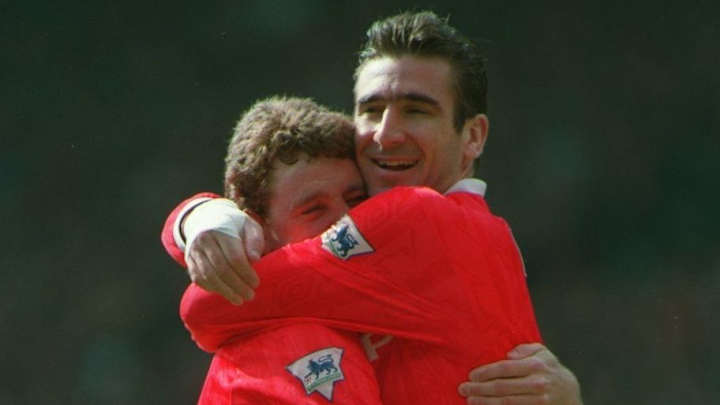25 Years Later: Eric Cantona's Impact on Manchester United

Manchester United fans recently celebrated the 25th anniversary of the day that Eric Cantona joined from Leeds, a momentous landmark in the modern history of the club and a catalyst for so much of the success and silverware that flooded Old Trafford in the years that followed.
Not only was Cantona a star himself, capable of truly outstanding feats of brilliance, he was a cult hero and an icon in the eyes of supporters, and an unforgettable mentor in the early careers of players like Ryan Giggs, Paul Scholes, Gary Neville, David Beckham and others that cemented a legacy long after he retired early at the age of just 30.
Eric Cantona and Paul Scholes. pic.twitter.com/PySG5xmMXV
— 90s Football (@90sfootball) December 2, 2017
Having won the last season of the old First Division with Leeds in 1992, the Frenchman officially became a United player on 26th November 1992. The fee of £1.2m was sizeable if not outrageous, and the deal had actually come about when Alex Ferguson (seven years before his knighthood) had turned the table on a Leeds enquiry for United full-back Denis Irwin.
It was too late for Cantona to make his debut when United played Arsenal just two days after his arrival on 28th November - the team won the game at Highbury thanks to a single Mark Hughes goal, while he made an unofficial debut in an exhibition game against Benfica on 1st December.
#OTD 1992 Leeds United sold a certain Eric Cantona to Manchester United for £1.2m. Best signing ever? pic.twitter.com/G4mQAeiu8v
— BBC Archive (@BBCArchive) November 26, 2017
Fans had to wait for as long as 11 days after his arrival before Cantona made his real United debut, now exactly 25 years ago on 6th December 1992. It was a Manchester derby in the Premier League, fitting given that is what awaits the current United team this weekend.
With the game finely balanced at 1-1 after first half goals from Paul Ince and Niall Quinn, the 26-year-old Cantona entered the contest as a half-time substitute in place of Ryan Giggs.
2⃣5⃣ years since the King took to the throne at Old Trafford... 👑 pic.twitter.com/iOazU1eJYb
— Manchester United (@ManUtd) December 6, 2017
Like George Best and Bryan Robson before him, and David Beckham and Cristiano Ronaldo after him, he would become synonymous with the club's number seven shirt. But in the days before fixed squad numbers, Cantona was wearing the number 12 on his debut. He would even wear number 11 on the final day of that season when an ageing Robson made a rare start.
With Cantona on the pitch - his contribution is said to have been rather limited - United went on to beat City after Mark Hughes scored the winner with just over 15 minutes remaining.
Cantona subsequently became a regular starter for United - getting his hands on the number seven shirt - and the team continued its winning streak when Hughes scored yet again to beat title rivals Norwich by a single goal to nil at Old Trafford.
The victory saw United rise from 5th to 4th, with a 1-1 draw against Chelsea pushing Ferguson's side up to third. That day, 19th December, saw Cantona score his first goal in United colors and marked the beginning of a run of netting in four consecutive Premier League games. By the end of that streak, the team had climbed to the top of the table.
Cantona finished the season with nine goals from 22 league appearances, with all nine scored in different games and many of them directly adding more invaluable points to United's tally.
As it was, United ended the campaign 10 points clear of second place Aston Villa and 12 points clear of third place Norwich. Crowned champions for the first time since the days of Matt Busby, Bobby Charlton, Denis Law and George Best, the club had broken a 26-year title drought.
Cantona went on to score 25 times in all competitions the following season as United completed a first league and FA Cup double in their history. He was once more in fine form in 1994/95, before his suspension for kicking an abusive Crystal Palace fan derailed United's title hopes.
His heroic return in 1995/96 brought about a second domestic double, while 11 further Premier League goals in the 1996/97 campaign, as United's first ever non-British or Irish club captain, yielded a fourth title in the space of just five years. It was to be his last, but his legacy lives on.
